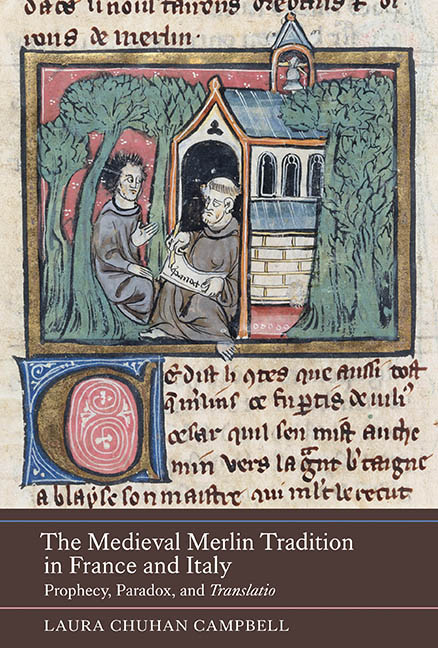Book contents
- Frontmatter
- Contents
- Miscellaneous Frontmatter
- Acknowledgements
- List of Abbreviations
- Introduction
- 1 Sympathy for a Devil? Merlin's Conception according to Robert de Boron and Paulino Pieri
- 2 Death of the Author: Merlin's Imprisonment by the Dame du Lac
- 3 Beyond the Limits of Interpretation: Rewriting Prophetic Discourse in the Estoire de Merlin and the Suite du Merlin
- 4 ‘Ce dit Merlin’: Open and Closed Prophecies in the Italian Merlin Tradition
- Conclusion
- Appendix 1 Chronology of Primary Texts
- Appendix 2 Summaries of the Principal Texts Discussed
- Bibliography
- Index
- Miscellaneous Endmatter
3 - Beyond the Limits of Interpretation: Rewriting Prophetic Discourse in the Estoire de Merlin and the Suite du Merlin
Published online by Cambridge University Press: 23 August 2019
- Frontmatter
- Contents
- Miscellaneous Frontmatter
- Acknowledgements
- List of Abbreviations
- Introduction
- 1 Sympathy for a Devil? Merlin's Conception according to Robert de Boron and Paulino Pieri
- 2 Death of the Author: Merlin's Imprisonment by the Dame du Lac
- 3 Beyond the Limits of Interpretation: Rewriting Prophetic Discourse in the Estoire de Merlin and the Suite du Merlin
- 4 ‘Ce dit Merlin’: Open and Closed Prophecies in the Italian Merlin Tradition
- Conclusion
- Appendix 1 Chronology of Primary Texts
- Appendix 2 Summaries of the Principal Texts Discussed
- Bibliography
- Index
- Miscellaneous Endmatter
Summary
In the prose Merlin, a short narrative derived from Geoffrey of Monmouth's Vita Merlini tells of a cynical baron at Pendragon's court who questions Merlin's prophetic gifts. In order to prove the prophet wrong, the baron comes to Merlin on three occasions, each time in a different disguise, asking to know the cause of his death. When he receives a different answer each time, the baron believes that he has exposed Merlin as a fraud: he is told firstly that he will break his neck, secondly that he will be hanged, and thirdly that he will be drowned. A short time later, however, he is killed when he falls from his horse over a bridge. All three of Merlin's predictions come true, as he breaks his neck from the fall, drowns in the water, and is left hanging from the horse's reins. Despite having been proven a true prophet, Merlin's response to this event is far from triumphant. In an attempt to avoid a repeat occurrence of this interrogation, he vows only ever to speak of the future in obscure terms: ‘je ne parleroie plus oiant le pueple se si oscurement non que il ne sauront que je dirai devant ce que il le verront’ [from now on, I will only speak in public so obscurely that no one will understand what I say until they see it happen] (p. 678). His prophecies are in future only to be understood once they become a reality.
The obscurity of Merlin's words derives ultimately from Geoffrey of Monmouth's Prophetiae Merlini, and was perhaps influenced by popular traditions deriving from presumed real-life prophets such as Joachim of Fiore. As we have seen, Merlin's omniscience accords him the status of a writer/translator, whose overview of the narrative can only be revealed bit by bit, within the sequential logic of the text. Here, the story of the baron's death exemplifies precisely the predicaments which occur when human beings are confronted with knowledge from beyond their own epistemological parameters. The baron is unable to understand that the three separate outcomes proposed by Merlin will happen at once; he is incapable of grasping the totality of time and meaning which is intrinsic to Merlin's omniscience – and to the idea of prophecy itself.
- Type
- Chapter
- Information
- The Medieval Merlin Tradition in France and ItalyProphecy, Paradox, and Translatio, pp. 101 - 140Publisher: Boydell & BrewerPrint publication year: 2017



